End of celibacy nigh, says Brisbane Catholic Archbishop Mark Coleridge
The Catholic Archbishop of Brisbane says married Indigenous men should be ordained in a first step to ending compulsory celibacy for priests.
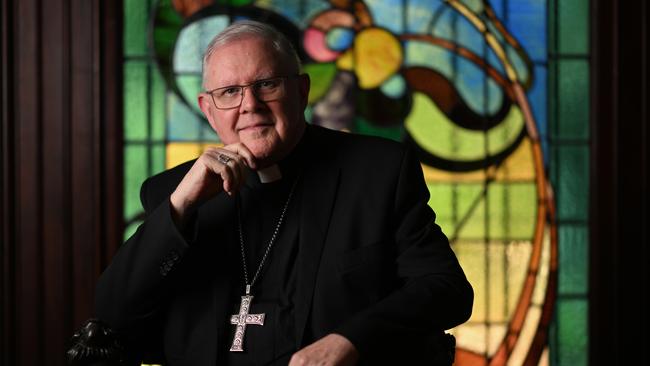
Married Indigenous men should be allowed to be ordained as Catholic priests and the centuries-old rule of compulsory celibacy will “very likely” ultimately be axed by the Vatican, one of the Church’s most powerful Australian clerics has declared.
Archbishop of Brisbane Mark Coleridge has warned that the world’s oldest and largest church will need to “look quite different” to flourish, ahead of an October meeting that will be one of the most important for the Catholic clergy in the past 50 years.
He has proposed an exemption for Indigenous priests and told The Weekend Australian it was necessary when there was “no way you’re going to recruit a celibate clergy in those cultures”.
West Australian Labor senator Patrick Dodson, a foundational figure in the Aboriginal reconciliation movement, is the only Indigenous man ever to be admitted to the Catholic priesthood.
“And Pat Dodson ended up leaving after a relatively short time,” Archbishop Coleridge said.
“I think it’s fairly bleak with regard to the church generally now. So one of the things I have just floated is that: is there reason enough to say that within Indigenous communities we will ordain married men?
“We have married clergy. I mean, some of the clergy who are from other churches are married men … so it’s not as if we don’t know married clergy.”
Archbishop Coleridge was referring to a little-known loophole that allows married ministers from the Anglican Church and other protestant denominations to jump ship and practice as Catholic priests. Many have children and continue living with their families.
The Pope appeared ready to test the water on celibacy after a special Vatican conference in 2019 recommended it be suspended in the Amazon region of South America to address a chronic shortage of priests there –only to retreat, with Francis saying further “discernment” was required. The issue will be revived in October at a two-part international synod in Rome on church practices, billed as the most important opportunity for change since the watershed Vatican II council 60 years ago.
Asked whether a relaxation of the celibacy rule was inevitable, Archbishop Coleridge said: “I wouldn’t use the word inevitable – there’s not much that’s inevitable in the church. But … I think it’s highly likely.
“I don’t know quite when or how, but the … question is certainly not going away. And I think there will come a point of maturation when it will look kind of the natural next step and not sort of an artificial or dramatic or untimely overturning of what’s been a very long tradition.”
Backing Archbishop Coleridge’s call for the change to start with Indigenous men, Bishop of Darwin Charles Gauci said: “With Aboriginal people, we need to be respectful of culture. Pope Francis has said that he is open in certain situations to ordaining married men; that is not off the agenda.
“The opportunity to have Indigenous priests ministering to their communities is one that we aspire to. I would be open to discussing this matter if it arose.”
Critics of clerical celibacy, which has been linked to child sexual abuse, argue it has no doctrinal basis when there is nothing in the Bible to say that priests must be chaste.
Some of the apostles including St Peter were recorded in the Gospels as being married.
But the Catholic position is that celibacy is a “special gift of God” that allows priests to serve with an undivided heart while emulating Christ’s chaste example.
Echoing this, a member of the graduating class of 2023 from Brisbane’s Holy Spirit Seminary, Isaac Falzon – one of three newly ordained priests profiled in The Weekend Australian Magazine – said his commitment to lifelong celibacy was “freely and happily” made. “It’s a certain lifestyle you’ve got to embrace,” the 36-year-old said. “When people think about intimate relationships, the mind automatically goes to sexual relationships. But that is only one part of a relationship. It’s the other parts that we find so fulfilling – the love you get to experience between people that’s non-sexual – and that’s a service, it’s life-giving and fulfilling and it’s part of our commitment to be celibate.”
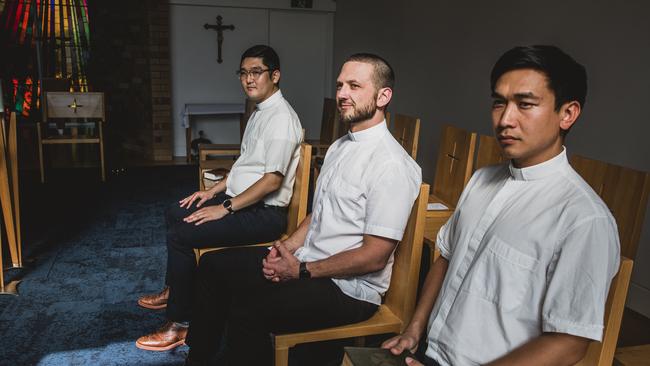
Archbishop Coleridge said the eastern Orthodox churches’ model to allow parish priests to marry while those seeking the rank of bishop or higher were celibate monks could be considered, though there were “pluses and minuses there”.
Asked how he had canvassed waiving celibacy for Indigenous candidates for the priesthood, the immediate past president of the Australian Catholic Bishops Conference said: “Just in conversations, informal discussions within the bishops’ conference. You know, we are deeply concerned with the church’s engagement with Indigenous people. And one of the things I’ve been saying loud and clear for some time is we need a new way to imagine and engage with the Indigenous peoples, and leadership is a key question. You can’t have the whitefella providing leadership; you’ve got to provide leadership from within the Indigenous communities.”
Presiding at the ordination of Father Falzon and classmates Father Gerard Lai, 29, and South Korea-born Father Minje Kim, 33, the archbishop said a growing shortage of priests meant the Catholic Church had to change “our current leadership mode” of providing a priest for every parish.
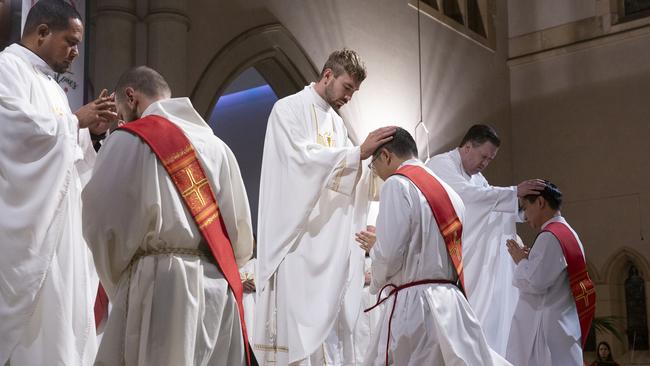
The five million Australians who identify as Catholic were served in 2021 by about 2900 priests, down from a peak of 3895 priests in 1971, research for the bishops’ conference shows. But an even sharper drop in the number of professed Catholics who attend mass meant the ratio of priests to churchgoers was holding steady, according to Perth academic Philippa Martyr. “We will probably run out of laity before we run out of priests,” she said.
Some 304 men were in training at seminaries around the country as of 2021. Two of the original five members of the class of 2023 at the Holy Spirit centre in northside Brisbane dropped out, a “fairly standard” attrition rate, said rector Neil Muir.
Archbishop Coleridge said priests in future would work as a member of a team at parish level, not the “one-man band” Australian Catholics were accustomed to. “We’re going to have to move to a larger configuration with a community of communities, led by a team, some of whom will be lay, one of whom or more will be ordained and there might be consecrated religious as well,” he said. “It’s a question of who’s got the gifts to provide the leadership in this community of communities.”
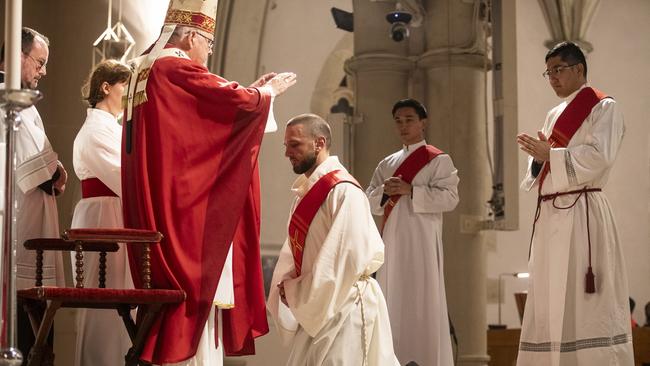
Asked where women fitted in when they were still barred from being ordained in the Catholic Church, Archbishop Coleridge said: “They are right at the heart of it … you can’t restrict leadership to the ordained.”
Pressed on when women might be admitted to the Catholic priesthood he said: “Well, there is a glimmer of possibility that they could be ordained in deacons” at an entry level in the clergy.
Archbishop Coleridge said he would not be attending the so-called Synod on Synodality in October convened by the Pope – with a follow-up meeting due next year – and it would be up to others to push for changes on priestly celibacy. In line with church practice, he will offer his resignation as Archbishop of Brisbane to Francis on turning 75 next month.
His successor as bishops conference president, Archbishop of Perth Timothy Costelloe, declined to comment.
Senator Dodson, 75, struggled during his time as a priest, clashing frequently with the then bishop of Darwin, John O’Loughlin. Bishop O’Loughlin declared it was not possible for an initiated Indigenous man to be a practising Catholic, cutting the then Father Dodson “to the heart of his identity”, according to biographer Kevin Keefe.



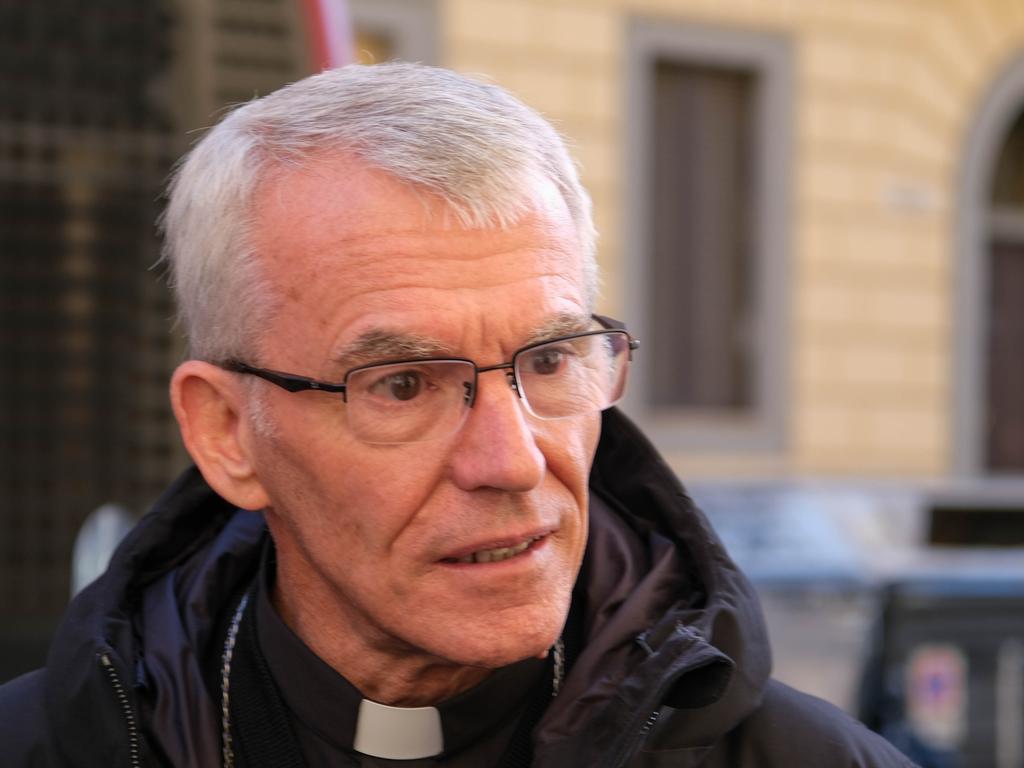

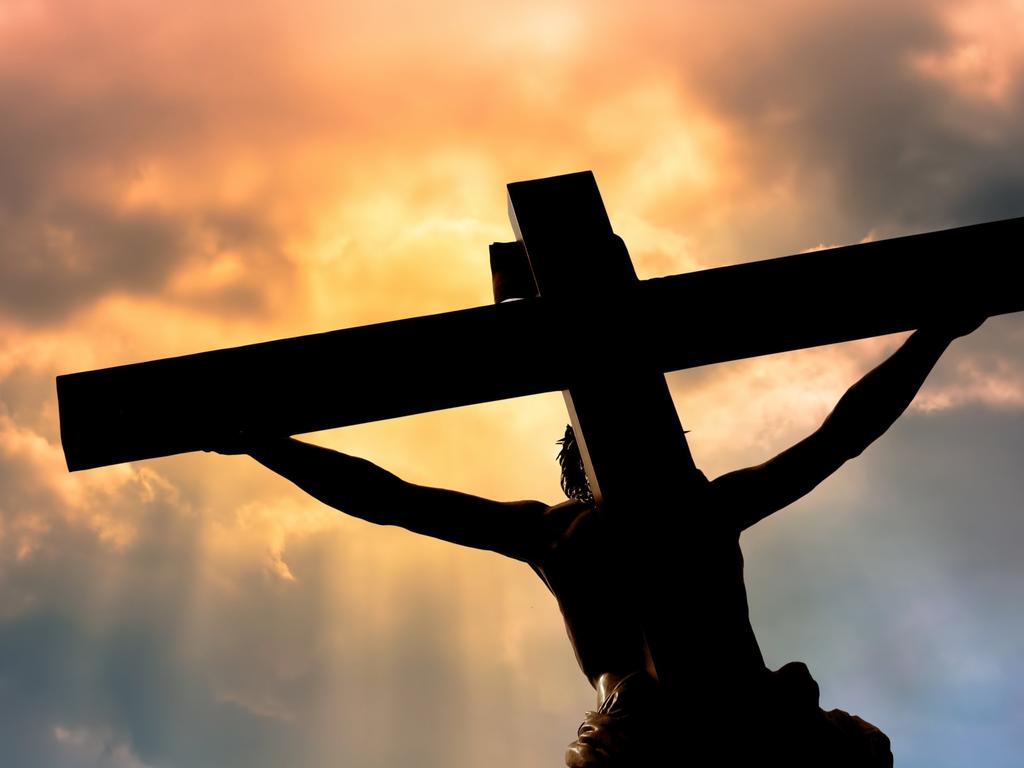


To join the conversation, please log in. Don't have an account? Register
Join the conversation, you are commenting as Logout